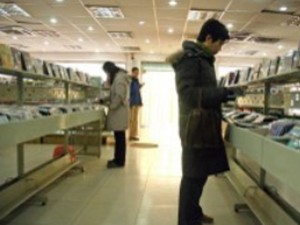US cites ‘many concerns’ over China business practices

Chinese customers select various pirated DVD movies at a shop in Beijing on January 2, 2010. AFP FILE PHOTO
WASHINGTON – The United States said Tuesday it harbored “many concerns” over China’s business practices, despite significant progress since the country’s 2001 accession to the World Trade Organization.
The United States Trade Representative (USTR) issued its findings in its annual report to Congress on China’s compliance with WTO regulations.
“While progress was made on some meaningful issues … many issues of concern remain,” the USTR report said.
The United States has denounced Beijing’s practices before the WTO on numerous occasions since China was admitted to the WTO, regularly accusing it of limiting foreign companies’ access to its domestic market or illegally subsidizing its own industries.
The USTR called on China to “reduce the role of the state in planning the economy, reform state-owned enterprises, eliminate preferences for domestic national champions and remove market access barriers currently confronting foreign goods and services.”
Article continues after this advertisementThe report welcomed an announcement by the Chinese Communist Party in November that the free market should be “decisive” and “dominant” but said Washington wanted to see the rhetoric “translate into changes.”
Article continues after this advertisementThe USTR, meanwhile, called on Beijing to overhaul its legal structure in order to better protect intellectual property.
“Critical changes to China’s legal framework are still needed in several areas, such as further improvement of China’s measures for copyright protection on the Internet,” the report said.
“Counterfeiting and piracy remain at unacceptably high levels and continue to cause serious harm to US businesses across many sectors of the economy.
“Indeed, in a study released in 2011, the US International Trade Commission estimated that US businesses suffered a total of $48 billion in lost sales, royalties and license fees due to IPR infringement in China in 2009.”
The USTR called on China to “eliminate the use of unauthorized software at all levels of government and to discourage the use of unauthorized software by enterprises, including major state-owned and state-invested enterprises.”
The USTR said China also continued to limit access to its market by foreign companies, in violation of WTO rules.
“China continued to pursue industrial policies in 2013 that seek to limit market access for imported goods, foreign manufacturers and foreign service suppliers, while offering substantial government guidance, resources and regulatory support to Chinese industries,” the summary said.
China remained among the “least transparent and predictable” of the world’s markets for agriculture products, largely because of selective intervention by the country’s regulatory authorities, the USTR said.
While the US would continue to engage in “productive” dialogue with China, Washington would “not hesitate” to invoke the WTO’s dispute settlement mechanism if required.